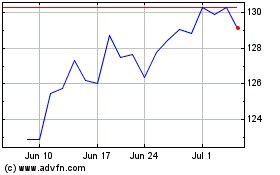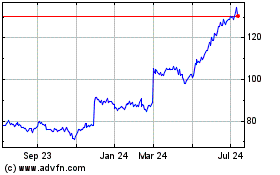By Don Clark
Employees at private-equity firm Carlyle Group used to wait
several minutes to hours for its computer systems to churn out some
financial reports. Now such tasks are often completed in seconds,
thanks to new-wave data-storage hardware from a startup called
Tintri Inc. it began installing a year and a half ago.
"I could not believe the difference," said Alan Thompson,
Carlyle's vice president of global information-technology
services.
Such testimonials are becoming commonplace as one of Silicon
Valley's least-sexy sectors turns into one of its hottest.
Technology for helping companies store data--the high-tech
equivalent of filing cabinets--has become crucial to speeding
operations to make companies nimbler. The change is giving storage
gear a bigger claim on corporate information-technology
dollars.
Well-funded storage startups are pressuring technology giants
like International Business Machines Corp., Hewlett-Packard Co.,
Dell Inc., EMC Corp. and NetApp Inc. Some newcomers are targeting
specific incumbents, which have responded by buying or building new
kinds of storage hardware.
"It's a knife fight," said Jeremy Burton, EMC's president of
products and marketing, referring to the competitive
environment.
Venture capitalists pumped more than $6 billion into 96 startups
selling storage-related hardware, software and services between
2010 and the first half of 2015, according to CB Insights.
Some, like Pure Storage Inc., are exploiting a shift from disk
drives to faster flash memory chips. The Silicon Valley startup
recently filed to go public after reaching a $3 billion private
valuation last year.
Others are combining computing and storage in multipurpose boxes
for other speed and cost advantages. Two such companies, Nutanix
Inc. and SimpliVity Corp., have also topped billion-dollar
valuations.
One reason: Companies will spend more than $40 billion in 2015
on storage hardware alone, research firm International Data Corp.
estimates. Many of the vendors--whose systems typically cost from
tens of thousands of dollars to hundreds of thousands--had exhibits
at VMware Inc.'s annual conference in San Francisco over the past
week.
At the same time, computers, mobile devices and other gadgets
are generating a rising flood of data that must be stored on
company premises or on cloud services. An IDC study, sponsored by
EMC, last year estimated that the volume of digital bits from all
sources will grow 40% a year into the next decade.
Companies like Pure, Kaminario, Violin Memory Inc. and SolidFire
Inc. have responded with systems that store data on flash memory
rather than hard drives, which have spinning disks and electrical
motors that are prone to mechanical failures and consume more
energy than semiconductors. Data stored on such chips can be
retrieved about 20 times faster than from drives, estimates Andy
Walls, a 34-year veteran of IBM who is chief technology officer and
chief architect of its flash-based systems business. Flash "is
changing the landscape and changing it dramatically," he said.
Blackline Inc. is a believer. The accounting-software company
began installing flash-based storage equipment from the Boston-area
startup Kaminario in November. Alain Avakian, Blackline's chief
technology officer, said the technology sped up its website
operations by 30% to 40%; data starts transferring in less than a
thousandth of a second--more than 60 times faster than the
company's prior storage hardware. "The speed was incredible," he
said.
Makers of disk drives--a technology that emerged in the late
1950s--have had decades longer to drive down costs compared to
flash memory, which began reaching huge commercial volumes in the
past decade after it became a mainstay of smartphones. Though it
has steadily fallen in price, flash technology remains more
expensive per byte of data stored. A 1 terabyte drive based on the
newer technology, for example, retails for about $500, compared
with $50 for a comparable hard drive.
So some storage startups, including Tegile Inc., Reduxio Systems
Ltd., and Nimble Storage Inc., offer a mix of flash and disk drives
to provide both increased speed with large storage capacities.
Other startups, such as Nutanix and SimpliVity, are borrowing
techniques from large cloud services to combine servers and storage
in "hyperconverged" hardware that can be simpler to use and faster
than using separate boxes.
Many companies say their technical advantages have less to do
with the hardware they sell than the software that comes with it,
which handles chores like optimizing performance and backing up
data. Some new vendors, in fact, only sell software, betting on the
appeal of low-cost commodity servers packed with flash chips or
disk drives. Software-only startups include Scality Inc.,
PernixData Inc. and Formation Data Systems.
Vendors also point to a more subtle issue: labor. Many companies
with traditional storage systems employ staffers to manage backups
and maximize performance by distributing data to various devices.
Newer devices are designed to eliminate or automate many such
tasks.
"You don't need to do that anymore," said Joris Vuffray, head of
networking and systems management at the Switzerland-based lottery
operator Swisslos, describing his experience with Nutanix gear.
The startups are pushing ahead despite a move by many companies
to rent computing services from the likes of IBM, Google and
Amazon.com Inc., reducing their need to buy and own their own
storage hardware.
Pure, which has raised $470 million in funding, has hired away
dozens of EMC sales people to aid its effort to target the storage
giant's customers.
EMC has lodged lawsuits alleging theft of trade secrets and
patent infringement against Pure, which denies the claims and
accuses EMC of violating its own intellectual property. Litigation
is still pending. EMC also bought two flash-based startups.
Revenue from EMC's mature disk-based hardware has been declining
lately. But Mr. Burton predicted sales of flash-based hardware will
reach $1 billion this year, outselling the top three or four rival
vendors combined.
Write to Don Clark at don.clark@wsj.com
Access Investor Kit for "NIRI Demo Co"
Visit
http://www.companyspotlight.com/partner?cp_code=P479&isin=US4592001014
Subscribe to WSJ: http://online.wsj.com?mod=djnwires
(END) Dow Jones Newswires
September 04, 2015 19:43 ET (23:43 GMT)
Copyright (c) 2015 Dow Jones & Company, Inc.
NetApp (NASDAQ:NTAP)
Historical Stock Chart
From Mar 2024 to Apr 2024

NetApp (NASDAQ:NTAP)
Historical Stock Chart
From Apr 2023 to Apr 2024
